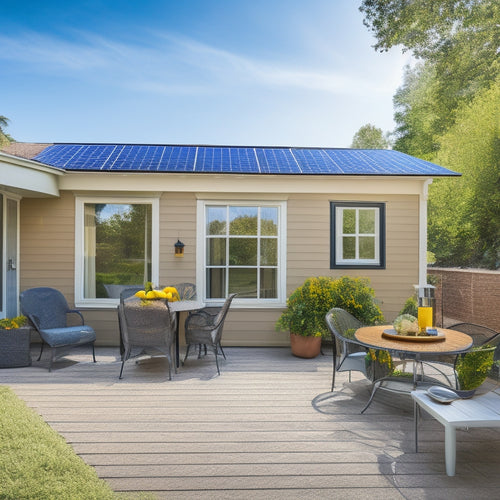
What's the Advantage of Rooftop Solar for Homes
Share
By installing rooftop solar, you'll reduce your reliance on fossil fuels, decrease your carbon footprint, and enjoy substantial long-term savings on your electricity bills, potentially slashing them by 50% to 75%. You'll also increase your home's value, appeal, and desirability, with solar-equipped homes selling for up to $15,000 more. Plus, you'll contribute to a low-carbon economy and combat climate change by preventing 3-4 tons of CO2 emissions annually. With federal and state incentives making it more affordable, you can start utilizing solar power and reaping its benefits – and there's even more to investigate.
Key Takeaways
- Rooftop solar reduces electricity bills by 50% to 75%, allowing homeowners to reallocate funds to other needs.
- Homes with solar panels can sell for up to $15,000 more, providing a higher return on investment compared to other home improvements.
- Rooftop solar contributes to energy independence, reducing reliance on fossil fuels and decreasing carbon footprint.
- Government incentives, such as federal tax credits and state-specific rebates, make rooftop solar more accessible and affordable for homeowners.
- Each kilowatt-hour generated by rooftop solar prevents 1.3 pounds of CO2 emissions, contributing to global efforts in combating climate change.
Renewable Energy for the Future
As the world shifts towards a low-carbon economy, you're likely considering the role renewable energy will play in powering your home.
With concerns about climate change and energy security on the rise, you're not alone in seeking a more sustainable living solution. One of the most promising alternatives is rooftop solar, which utilizes the power of the sun to generate electricity.
By investing in rooftop solar, you're taking an essential step towards energy independence, reducing your reliance on fossil fuels and decreasing your carbon footprint.
This clean energy source not only benefits the environment but also enhances your home's value and appeal.
As governments and corporations continue to prioritize renewable energy, you'll be at the forefront of the sustainable living movement, reaping the rewards of a cleaner, greener future.
Reduces Electricity Bills Dramatically
By utilizing the sun's energy with rooftop solar, you can greatly slash your electricity bills. This reduction in energy costs is a significant advantage of rooftop solar for homes. With solar panels generating electricity from sunlight, you'll be less reliant on the grid, achieving a level of energy independence.
The amount you can save on your electricity bills depends on several factors, including your energy usage, solar panel system size, and local electricity rates. However, on average, homeowners with rooftop solar systems can save between 50% to 75% on their electricity bills.
Over time, these savings can add up, allowing you to allocate more funds to other important aspects of your life.
Additionally, rooftop solar systems require minimal maintenance, resulting in low maintenance costs. This means you can enjoy the benefits of reduced electricity bills without worrying about high upkeep expenses.
Increases Property Value Significantly
Your home's worth gets a significant increase with the installation of rooftop solar. This is because solar panels are considered a prized asset that can attract potential buyers if you decide to sell your property in the future. In fact, studies have shown that homes with solar panels sell for up to $15,000 more than similar homes without them.
| Benefits | Description |
|---|---|
| Increased Property Worth | Solar panels increase your home's worth, making it more attractive to potential buyers |
| Higher Investment Return | Solar panels provide a higher return on investment compared to other home improvements |
| Competitive Advantage | Homes with solar panels stand out in the property market, giving you a competitive edge |
| Long-Term Savings | Solar panels provide long-term savings on electricity bills, making your home more desirable |
Lowers Carbon Footprint Quickly
Nearly every kilowatt-hour of electricity generated by rooftop solar panels prevents approximately 1.3 pounds of carbon dioxide from being released into the atmosphere.
This means that by installing rooftop solar panels, you're markedly reducing your carbon footprint.
In fact, a typical residential solar panel system can prevent around 3-4 tons of carbon dioxide emissions per year.
That's equivalent to planting over 100 trees annually!
Government Incentives Available Now
Through various programs, the government offers enticing incentives to homeowners who invest in rooftop solar panels. As you consider making the switch, you'll want to take advantage of these benefits to maximize your return on investment.
You're eligible for federal tax credits, which allow you to claim a considerable portion of your solar panel installation costs as a credit against your federal income taxes. This can lead to substantial savings, reducing the overall cost of your solar panel system.
Additionally, many states offer rebates and incentives, such as cash back or property tax exemptions, to further sweeten the deal. These state-specific programs vary, so be sure to research the incentives available in your area.
By combining federal and state incentives, you can significantly reduce the upfront cost of your rooftop solar panel system, making it more accessible and affordable.
Frequently Asked Questions
How Long Does It Take to Install Rooftop Solar Panels?
You'll typically spend 1-3 days waiting for permits, then 2-5 days on the installation process, which includes evaluating your roof, installing racking, and mounting solar panels, bringing the total installation timeline to around 5-10 business days.
Can I Install Rooftop Solar Panels Myself?
You're a brave warrior, ready to conquer the rooftop solar installation battle alone, but beware, DIY installation can be a treacherous path, maneuvering through complex rooftop regulations, so tread carefully, or risk falling into the pit of incomplete permits and faulty connections.
Are Rooftop Solar Panels Resistant to Weather Damage?
You'll be relieved to know that rooftop solar panels are designed with weather resilience in mind, featuring durable materials and construction that guarantee panel durability, allowing them to withstand harsh weather conditions, including heavy rain, hail, and extreme temperatures.
Do Rooftop Solar Panels Require Regular Maintenance?
As you utilize the sun's energy, you'll find rooftop solar panels require minimal upkeep, but you'll still need to periodically inspect and clean them using specialized techniques to guarantee peak performance, just like a well-oiled machine.
Can I Sell Excess Energy Back to the Grid?
You can sell excess energy back to the grid through net metering, which measures your production and consumption, allowing you to offset your energy bills and achieve energy independence, while also providing a potential source of revenue.
Related Posts
-

Waterproofing Solar Panels for Vehicles: A Step-by-Step Guide
When waterproofing solar panels for your vehicle, start by evaluating your energy requirements and selecting the righ...
-

10 Tips to Buy Affordable Solar Panels Online
When purchasing affordable solar panels online, you'll want to research reputable retailers, compare prices, and chec...
-

10 Best Solar Panel Options for Motorhomes Online
When choosing the best solar panel for your motorhome, consider factors like efficiency, durability, and design. You'...


